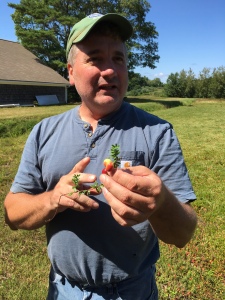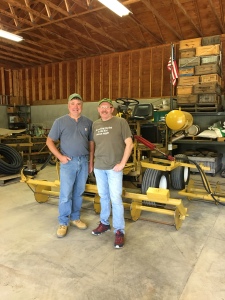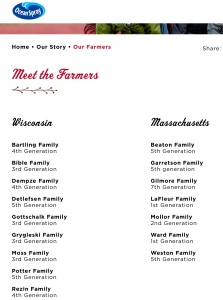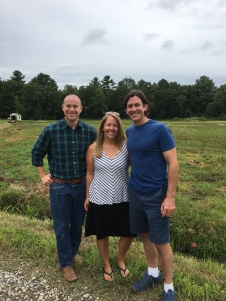 Not much is certain in life and many cooperatives either don’t get moving in the first place, or fail later on (just like lots of other enterprises). So why do some survive and prosper for generations? Almost 90 years in the case of Ocean Spray, which started in the 1930’s.
Not much is certain in life and many cooperatives either don’t get moving in the first place, or fail later on (just like lots of other enterprises). So why do some survive and prosper for generations? Almost 90 years in the case of Ocean Spray, which started in the 1930’s.
Are there certain activities that have ‘characteristics’ that favour the creation and sustainability of cooperatives? Is Cranberry growing one of those activities?
This is a really complex question to try and answer in a blog post, but bear with me. I’m going to try and condense what I learned from spending time with two of the Grower Owners of Ocean Spray and their Director responsible for Cooperative Development (yes, I did get to stand in a Cranberry bog while I did it).
So, if I had to identify two characteristics that contribute to Ocean Spray being a successful cooperative they would be; People and Plants. People is about the farmers who grow the Cranberries, their culture, heritage and (cooperative) behaviours. Secondly the cranberry plants themselves – the peculiarities of Cranberries almost demand a level of long term thinking that supports cooperative behaviour.
 Ocean Spray is HUGE! (and successful). Just to set the context Ocean Spray is a cooperative based in Southern Massachusetts on Cape Cod, where Cranberries were first commercially grown in the late 1800’s. It can trace its formation back to 1930.
Ocean Spray is HUGE! (and successful). Just to set the context Ocean Spray is a cooperative based in Southern Massachusetts on Cape Cod, where Cranberries were first commercially grown in the late 1800’s. It can trace its formation back to 1930.
They are a global operation, turning over almost $2 Billion annually, and they are owned and controlled by about 700 Grower Owners (Farmers). This article from the Boston Magazine gives a summary of some key facts like; 6,900 jobs being the tied to Cranberry production in Massachusetts or the fruit has four air chambers which make them float when they are harvested.
If you want a really detailed (57 page) read about Ocean Spray, this University of Wisconsin paper by Edward Jesse and Richard Rogers does the job: Ocean Spray Cooperative, Lessons in Cooperative Governance.
By comparison, according to WalesOnline, the largest private companies based in Wales are Iceland Foods (£2.8 Billion) and Admiral Insurance (£2.5 Billion).
Looking at just cooperatives, according to the data explorer on the Cooperatives UK website (link here), the combined value of all cooperatives in Wales is about £395 million. Most of this is made up by the 10 largest cooperatives, with Clynderwyn and Ceredigion Farmers accounting for £48 million and South Caernarfon Creameries £33 million. So, Ocean Spray are in a completely different league compared to what’s happening in Wales.
Plants and People equal long term success. I mentioned earlier that there might be certain characteristics that contribute to the success of Ocean Spray as a cooperative. Here are a few of my thoughts on each of these, there will be many other things that influence success like; really efficient production systems, effective marketing strategies and good management. This is just my take on a specific area.
 Cranberry Characteristics:
Cranberry Characteristics:
- Cranberries are native to Southern Massachusetts and are well adapted to the environmental conditions; acidic bogs, which aren’t very well suited to other crops.
- They are a perennial plant – growing for many years, with some Cranberry bogs being over a 100 years old. You can read more about Cranberries here.
- Creating a new bog (or refurbishing an old one) is a high cost, long term investment. In addition the ‘new’ plants aren’t likely to produce fruit for 3 years. Realistically the ‘pay-back’ time could be approaching 5-10 years, making it at best a medium term investment.
- The specialist nature of the Cranberry plant and harvesting methods means that the mainstream agricultural equipment manufactures don’t make equipment for Cranberry farmers (I didn’t see many John Deere dealerships on my travels).
- This means that equipment tends to be bespoke, manufactured within the Cranberry community and built to last, because you can’t just drive to John Deere if it breaks down.
- All in all, I think this combination of; a strong heritage, long term thinking and the need to be self reliant, supports the idea of being a cooperative.
- It’s all about planning for the long term and supporting the other growers around you, rather than chasing quick profits through ‘cash crops’. You just can’t jump ‘in and out’ of Cranberries.
 Cranberry People:
Cranberry People:
- Cranberry production feels like it is wrapped up in the history of the Pilgrims who originally settled in Massachusetts. Maybe it’s no coincidence that one of the bogs I visited was called Mayflower Cranberries. Named after the ship, The Mayflower that the original settlers travelled on in 1620.
- Surviving those early years in the 1600’s will have required a high degree of cooperative behaviour. I might be over romanticising things but perhaps this has influenced the culture and behaviour of the community and in particular the Cranberry Farmers?
- I do know there is a great recognition of the heritage and longevity associated with Cranberry farms. The Ocean Spray ‘Meet the Farmers’ page (link here) on their website talks about some of the farms that have been operated by the same family for several generations.
- Where I met first generation farmers they were very aware of this, and what it meant to be part of the ‘Ocean Spray family’ and the cooperative. It wasn’t just about growing Cranberries, it was something much bigger, and long term.
- One other thing was just how connected the ‘family’ are. I know lots of farmers like to share and talk with each other, but this was a very connected community. While I was at one of the bogs there was a text conversation going on in the background, updating everyone on the implications of the rain storms the previous night – in Wisconsin, over a 1,000 miles away!
- As with the nature of Cranberries, does this nature (and behaviour) of the Cranberry People suit itself to being a cooperative? A strong heritage of working together, caring about the wellbeing of your neighbours and being highly connected with them?
 As I said earlier, there will be many other factors that contribute to Ocean Spray being a huge and very successful cooperative. I just wonder if the characteristics Cranberries (the product), and above all The People, help significantly in the process of becoming a cooperative and maintaining it.
As I said earlier, there will be many other factors that contribute to Ocean Spray being a huge and very successful cooperative. I just wonder if the characteristics Cranberries (the product), and above all The People, help significantly in the process of becoming a cooperative and maintaining it.
Thanks very much to the people at Ocean Spray who generously shared their time and knowledge, I very much appreciate what you did for me, thank you; Jeff LaFleur, (Mayflower Cranberries, Ocean Spray Board Director); Iain and Christine Ward, (Highland Cranberry, Ocean Spray Council Member – Iain) and Mike Viano (Director of Cooperative Development at Ocean Spray).
So, What’s the PONT?
- There are many things that contribute to making a successful cooperative. I’ve only identified two that I think are important – the product (or service) and the people.
- The product or service might have characteristics that are highly compatible with being delivered cooperatively. Would things like social care be more suited to cooperative delivery than through a ‘for profit’ approach? Are Cranberries more suited to cooperatives or does this apply more widely to agriculture?
- People are the key part for me. Being part of a cooperative requires a way of thinking and behaving that involves more than just your own wellbeing, and taking a longer term view of the world. Dare I say it, thinking about the Wellbeing of Future Generations. Perhaps we can learn something in Wales about the practical application of the Wellbeing of Future Generations Act from Cranberry Farmers in Massachusetts?

Leave a comment